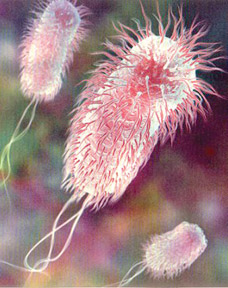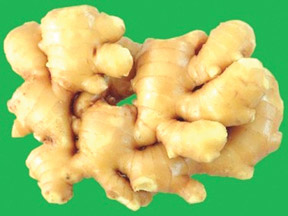|
E coli outbreaks:
What are they and how do they affect us?
by Dr. Sujeewa GUNARATNE
 The E coli outbreak reported in May 2011 in Germany, and continued
during the month of June resulting in 48 deaths and 4077 cases created
havoc among citizens, tourists, health administers and politicians in
the country. It spread fear in neighbouring countries as well as far
away countries, since trade is globalized and there is high chance for
diseases to spread worldwide. The bacteria responsible for the outbreak
were identified as E coli O104: H4, a strain of E coli. This article
intends to add to your knowledge on E coli and help you take precautions
against E coli that cause diseases. The E coli outbreak reported in May 2011 in Germany, and continued
during the month of June resulting in 48 deaths and 4077 cases created
havoc among citizens, tourists, health administers and politicians in
the country. It spread fear in neighbouring countries as well as far
away countries, since trade is globalized and there is high chance for
diseases to spread worldwide. The bacteria responsible for the outbreak
were identified as E coli O104: H4, a strain of E coli. This article
intends to add to your knowledge on E coli and help you take precautions
against E coli that cause diseases.
Escherichia coli or E coli are bacteria commonly found in intestines
of warm blooded animals and humans. It was first isolated by T.
Escherich in 1885 and was named after him. The bacteria are rod shaped
and they can live without air, for instance, inside human and animal
intestines. A strain of E coli means a sub group of E coli with unique
characteristics. Some E coli strains are harmless, while some other E
coli strains cause multiple diseases and discomforts to their animal or
human hosts.
Harmless E coli
Billions of E coli live in intestines of warm blooded animals and
humans. They live in large numbers in human bodies so that one could say
their numbers out do the number of cells in a human body. While living
in human intestines, they protect or shield the intestines from invading
harmful bacteria and fungi. Any living being has to fight for space to
live, so by being present in very large numbers, these harmless and
friendly E coli out-compete pathogens or the bacteria that cause
diseases. Useful E coli also secrete substances that are toxic to
invading bacteria and thereby inhibit (adversely affect) the growth of
pathogens. Apart from protecting us from disease causing bacteria, E
coli help us by secreting the vitamins, vitamin K and B12. Vitamin K
involves in our body in blood clotting and bone formation. Vitamin B12
is needed for our healthy blood cells and nerve functions. Another
service offered to us by friendly E coli is the formation of lactase,
the enzyme that breaks down lactose, the sugar found in milk and dairy
products. The presence of friendly E coli in human intestines helps us
to counter lactose-tolerance, which means the inability to consume and
digest lactose after the first few years of life. This account shows us
that harmless and useful E coli are an essential part of human life.
Pathogenic E coli
 Pathogenic E coli are just the opposite of friendly and useful E
coli. They cause humans a multitude of diseases. Gastrointestinal tract
disorders such as diarrhoea and dysentery, Haemolytic Uremic Syndrome
(HUS), urinary tract infections, pneumonia and meningitis are some of
them. let's discuss the most common diseases caused by pathogenic E
coli. Pathogenic E coli are just the opposite of friendly and useful E
coli. They cause humans a multitude of diseases. Gastrointestinal tract
disorders such as diarrhoea and dysentery, Haemolytic Uremic Syndrome
(HUS), urinary tract infections, pneumonia and meningitis are some of
them. let's discuss the most common diseases caused by pathogenic E
coli.
Diarrhoea
Diarrhoea is the most common disorder caused by E coli. Different
strains of E coli may cause diarrhoea in humans when they consume
unclean drinking water, unhygienically prepared food or food
contaminated with pathogenic E coli. The common symptoms are diarrhoea
that lasts for many days, abdominal pain and fever. Travellers who may
have consumed unhygienically prepared food or unclean drinking water may
suffer from Traveller's diarrhoea caused by Enterotoxigenic E coli. This
strain of E coli produces toxins once it colonises the surface cells of
the small intestine. These toxins cause heavy water loss from the body
by means of diarrhoea and loss of iron balance in body fluids. If not
treated with antibiotics in time, even death may occur.
Haemolytic Uremic Syndrome
Haemolytic Uremic Syndrome (HUS) is considered the worst disease
caused by E coli'. It is caused by the strains E coli O104:H4 and E coli
O157:H7. While many previous outbreaks resulting in HUS have been caused
by E coli O157: H7, the recent outbreak in Germany was caused by E coli
O104: H4. According to the reports, 48 deaths and 4700 cases were
reported. The non Germans who were affected, had travelled to Germany at
least for a short period. The major symptoms of HUS are bloody watery
diarrhoea, red skin patches due to low platelet counts and kidney
failure. The bacteria can be transmitted to humans from fresh
vegetables, meat, undercooked beef, raw milk, unclean water and other
contaminated food. It colonises in the human gastrointestinal tract,
producing a deadly toxin that kills the cells lining the tract. If not
treated, the bacteria perforate the colon causing blood loss and spread
the infection throughout the abdominal cavity. Ultimately blood
transfusion and haemodialysis would be required to save the patient's
life. Mode of transmission of E coli into humans
E coli is transmitted into human bodies rom various sources and
routes. Given below are some of them.
· Drinking un-boiled or contaminated water
· Eating meat and fish products not properly cooked
· Drinking unpasteurized milk
· Eating raw fruits that are not properly washed
· Eating raw vegetables such as salad leaves, cabbage, carrots, green
leaves without sufficient washing
· Inadequate cooking of vegetables
How can humans prevent food -borne diseases related to E Coli?
· Wash hands carefully with soap before cooking and eating
· Cook meat and fish products sufficiently
· Avoid slow defrosting of fish or meat in the kitchen
· Drink boiled water, pasteurized milk
· Avoid eating suspicious food (perishable food kept overnight
without refrigeration)
· Take extreme care after handling baby or adult diapers, and caring
for pets
· Cook green leaves and vegetables well, especially after flood
periods
· Wash all fruits, vegetables and leaves under running water.
Avoiding re-using water in washing bowls.
Frequency of E coli outbreaks
E coli outbreaks in the world are not uncommon. They occur in the
developed world just as much as they occur in the developing countries.
The Centres for Disease Control and Prevention, USA has reported more
than 10 outbreaks of E coli in the period of 2006 to 2011. Most of them
were caused by E coli O157: H7 contaminated from ground beef, fresh
spinach, cheese and lettuce. In one outbreak which occurred in May 2010,
the contaminant was E coli O145 strain which was linked to Romaine
lettuce. The record keeping of diseases in developing countries is not
as developed as in developed countries, and some sicknesses may even not
be reported. In some other cases, the sickness is reported but the
disease causing agent is not identified and recorded.
Nosocomial Infections
Nosocomial infections are infections acquired in the hospital. Though
a hospital is meant to be a place providing medication and rest, due to
treating many patients with infectious diseases, it is also a reservoir
for disease causing bacteria such as E coli. They are known to cause
urine infections, post -surgical wound infections and respiratory tract
infections.
The public tends to think that it is the duty of the government and
health authorities to protect them against diseases and treat when they
are sick.
The public duty in preventing outbreaks
Yet, the public too can and must do their part. Given below is what
the public must do in times of disease outbreaks.
· Pay more attention to personal hygiene
· Wash hands after being in public places
· Be cautious in eating out
· Report diarrhoea and fever conditions to medical practitioners
immediately
· Keep sick children at home or under medical care, avoid sending
them to school or day care centres
· Avoid reporting to work places while having diarrhoea or fever
· Separate sick persons from others to avoid spreading of diseases.
The writer is a Consultant Food Technologist and a Visiting Lecturer.
|

